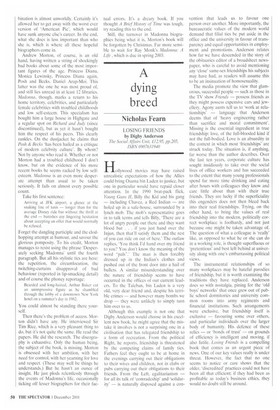dying breed
Nicholas Fearn
LOSING FRIENDS by Digby Anderson The Social Affairs Unit, £12.95, pp.205, ISBN 0907631940 Hollywood movies may have raised unrealistic expectations of how the Allies could bring Osama bin Laden to justice, but one in particular would have repaid closer attention. In the 1990 brat-pack flick, Young Guns II, Billy the Kid and his gang — including Chavez, a Red Indian — are holed up in a safe-house, surrounded by a lynch mob. The mob's representative goes in to talk terms and tells Billy, 'There are a lot of angry people out there and they want blood but . . . if you just hand over the Injun, then that'll satisfy them and the rest of you can ride on out of here.' The outlaw replies, 'You think I'd hand over my friend to you? You don't know the meaning of the word "pals": The man is then forcibly dressed up in the Indian's clothes and pushed out of the front door into a hail of bullets. A similar misunderstanding over the nature of friendship seems to have occurred in the offices of our current leaders. To the Taleban, bin Laden is a very old, very dear friend and, despite his terri
ble crimes and however many bombs we drop they were unlikely to simply turn him over to us.
Although this example is not one that Digby Anderson would choose in his excellent new book, he might agree that the mistake it involves is not a surprising one in a civilisation that has relegated friendship to a form of recreation. From the political Right, he reports, friendship is threatened by the competing claims of family ties. Fathers feel they ought to be at home in the evenings carrying out their obligations to their wives and children, not in clubs or pubs carrying out their obligations to their friends. From the Left, egalitarianism — for all its talk of 'comradeship' and 'solidar
ity' is naturally disposed against a con vention that leads us to favour one person over another. More importantly, the bureaucratic values of the modern world demand that filial ties be put aside in the office and the university in favour of transparency and equal opportunities in employment and promotions. Anderson relates how far we have descended in the story of the obituaries editor of a broadsheet newspaper, who is careful to avoid mentioning any 'close' same-sex friendships his subjects may have had, as readers will assume this to be an insinuation of homosexuality.
The media promote the view that glamorous, successful people — such as those in the TV show Friends — possess friends as they might possess expensive cars and jewellery. Agony aunts tell us to 'work at relationships' — language that Anderson deems that of 'heavy engineering rather than sacrifice and moral commitment'. Missing is the essential ingredient in true friendship: love, of the full-blooded kind if not the full-bodied. Love is an absurdity in the context in which most 'friendships' are struck today. The situation is, if anything, far worse than the author describes. Over the last ten years, corporate culture has sought insidiously to take over the social lives of office workers and has succeeded to the extent that many young professionals spend far more time drinking and eating after hours with colleagues they know and care little about than with their true friends. They are lucky if the superficiality this engenders does not then bleed back into their real friendships. Trying, on the other hand, to bring the values of real friendship into the modern, politically correct workplace is foolhardy, and not just because one might be taken advantage of. The question of what a colleague is 'really' like, as opposed to what he or she can do in a working role, is thought superfluous or 'pretentious' and best left behind at university along with one's embarrassing political views.
The instrumental relationships of so many workplaces may be hateful parodies of friendship, but it is worth examining the traditions they have replaced. Anderson does so with nostalgia, pining for the 'old boys' networks' that once grew out of public school dormitories and university common rooms into army regiments and financial institutions. Such arrangements were exclusive, but friendship itself is exclusive — favouring some over others, and particular individuals over the larger body of humanity. His defence of these relics — or 'bonds of trust' — on grounds of efficiency is intelligent and moving, if also futile. Losing Friends is a compelling book that comes as an urgent piece of news. One of our key values really is under threat. However, the fact that no one seems to notice or care shows that the older, 'discredited' practices could not have been all that efficient; if they had been as profitable as today's business ethics, they would no doubt still be around.




















































































 Previous page
Previous page